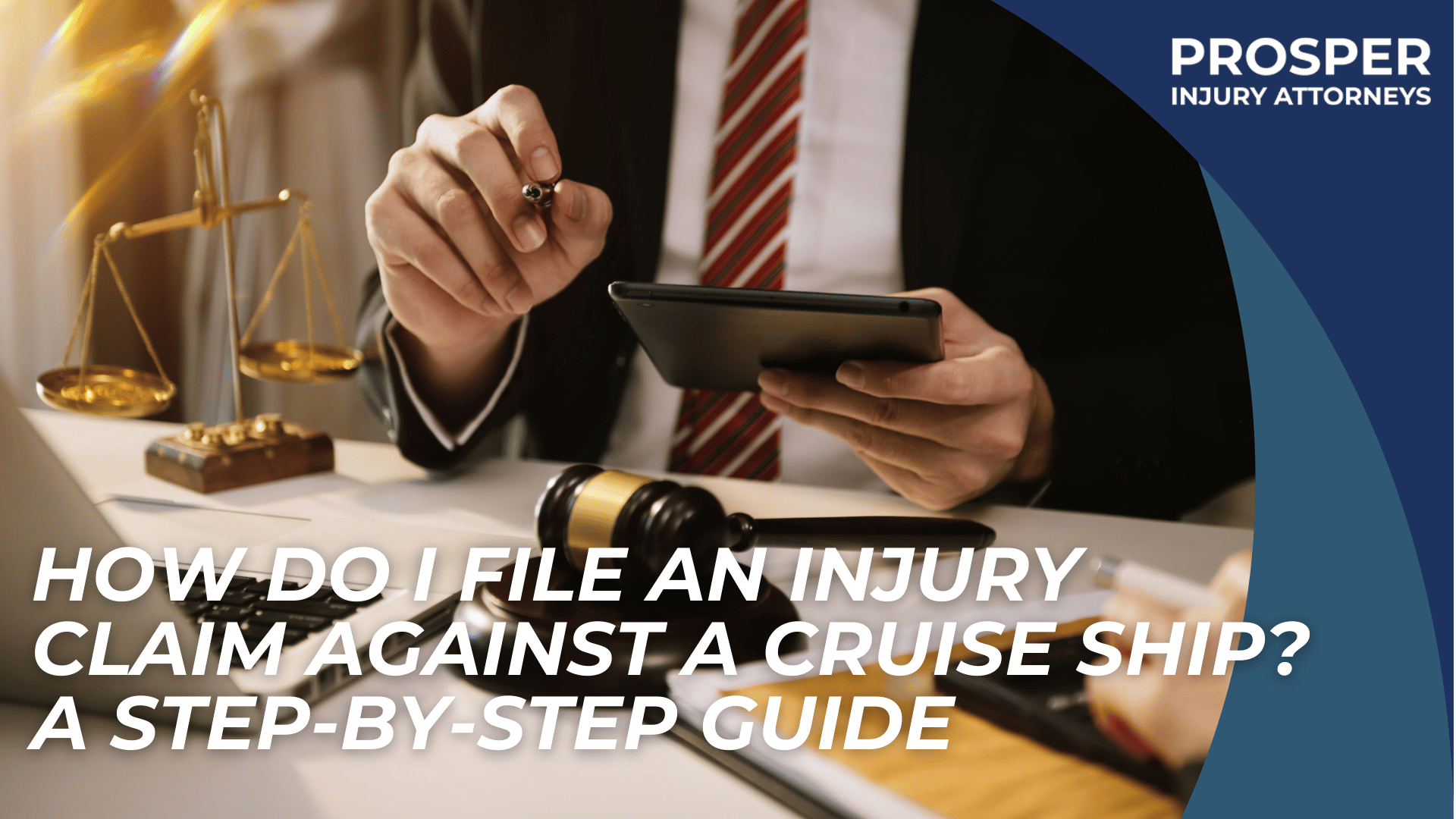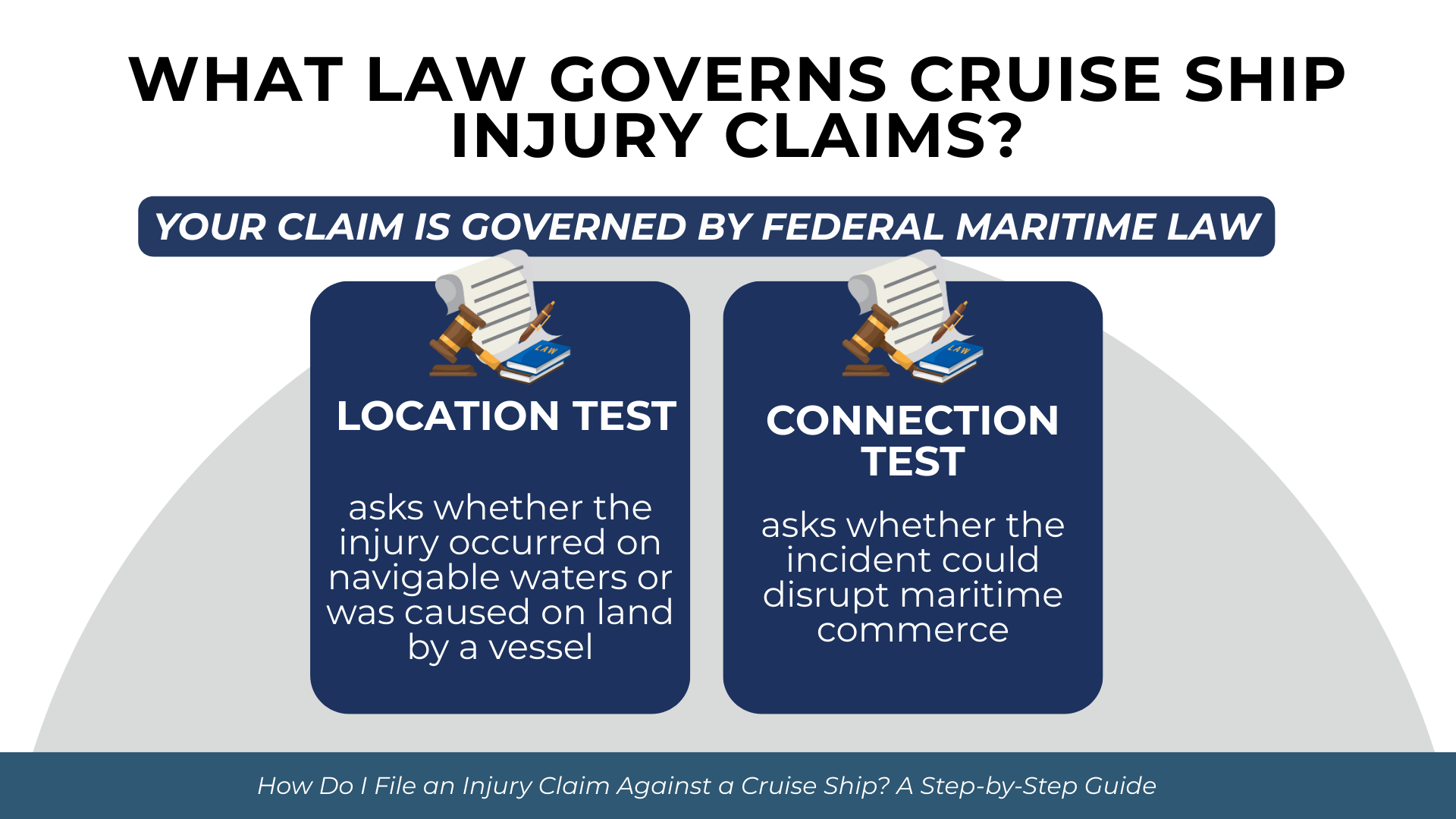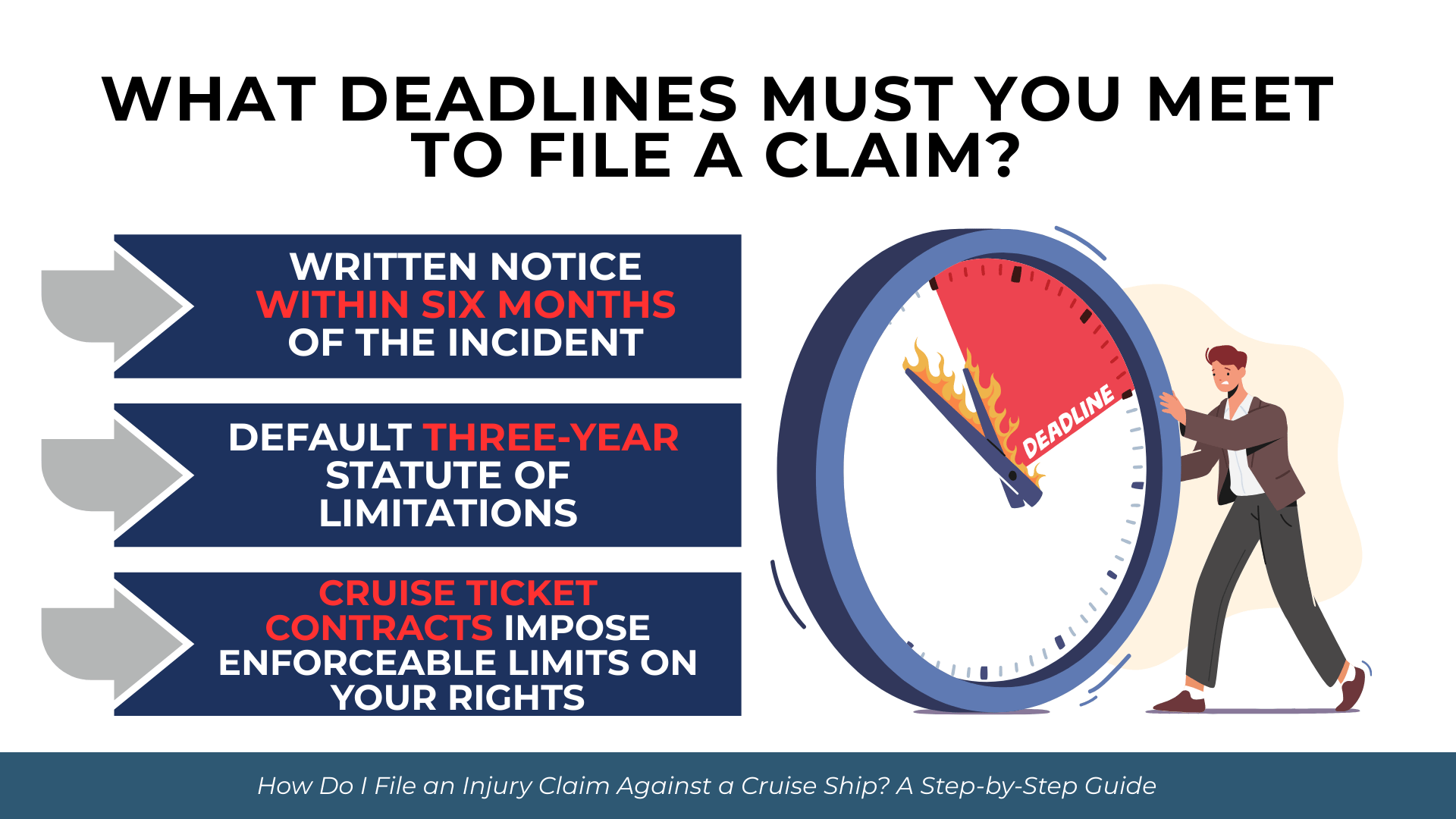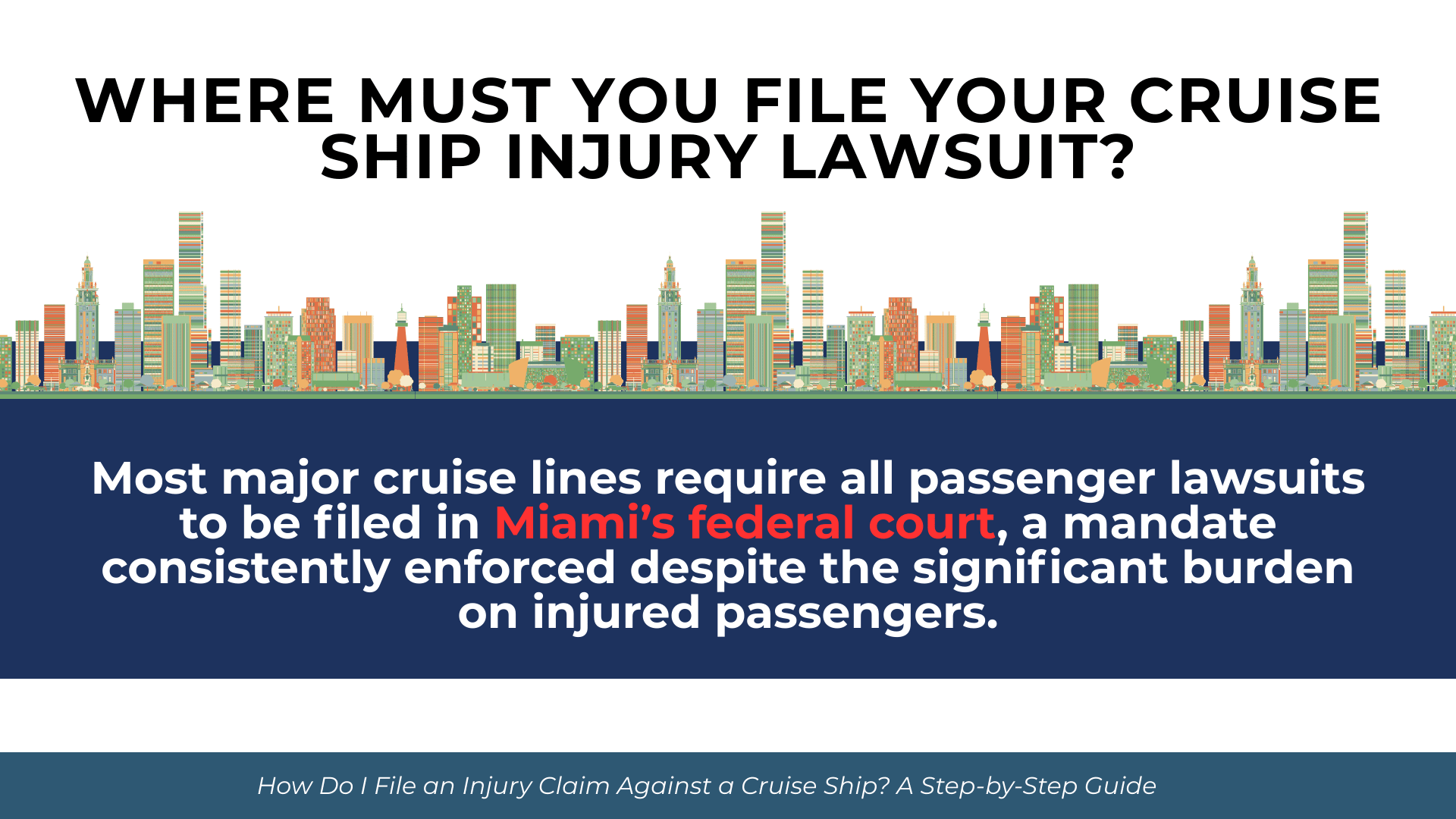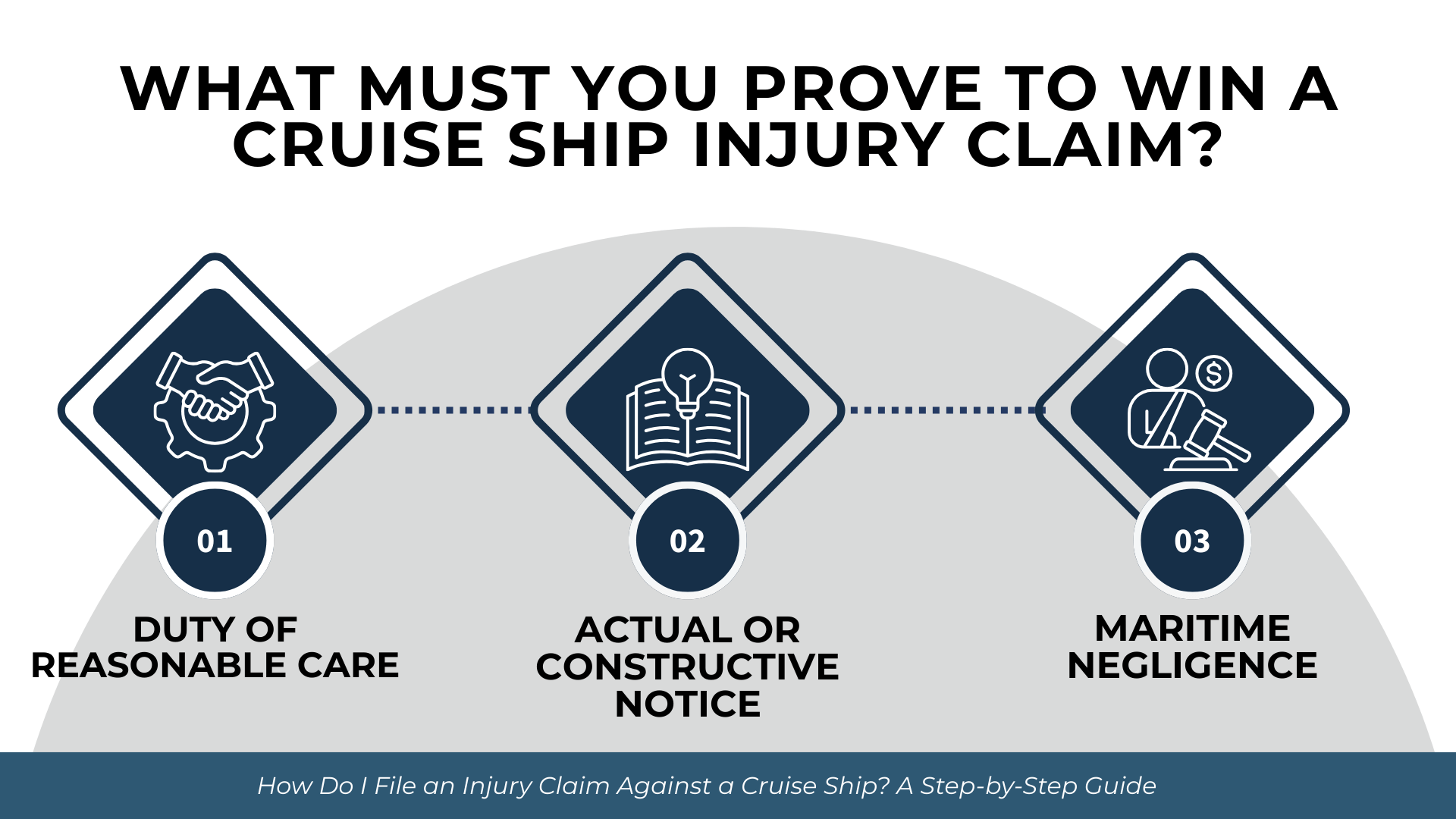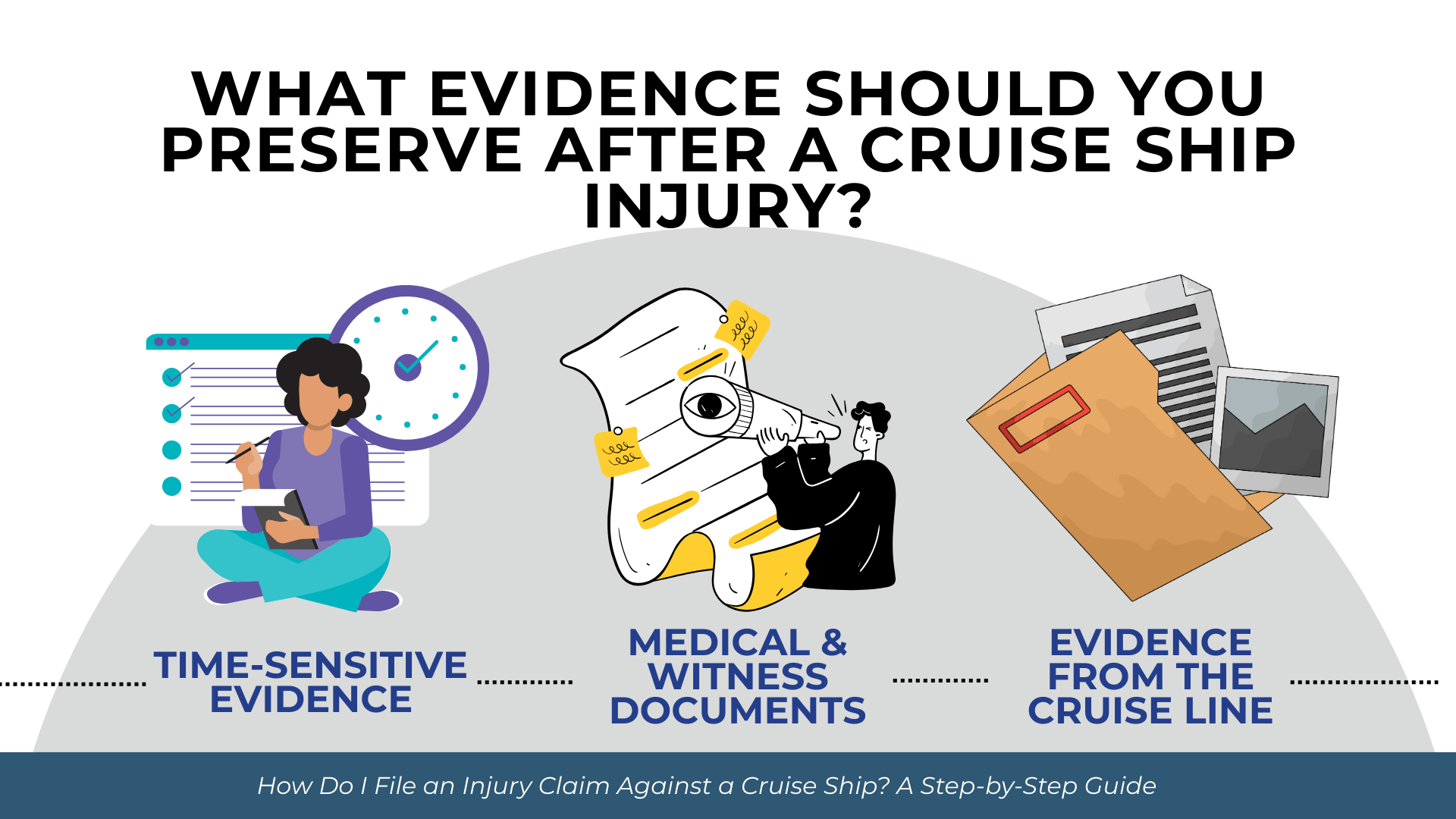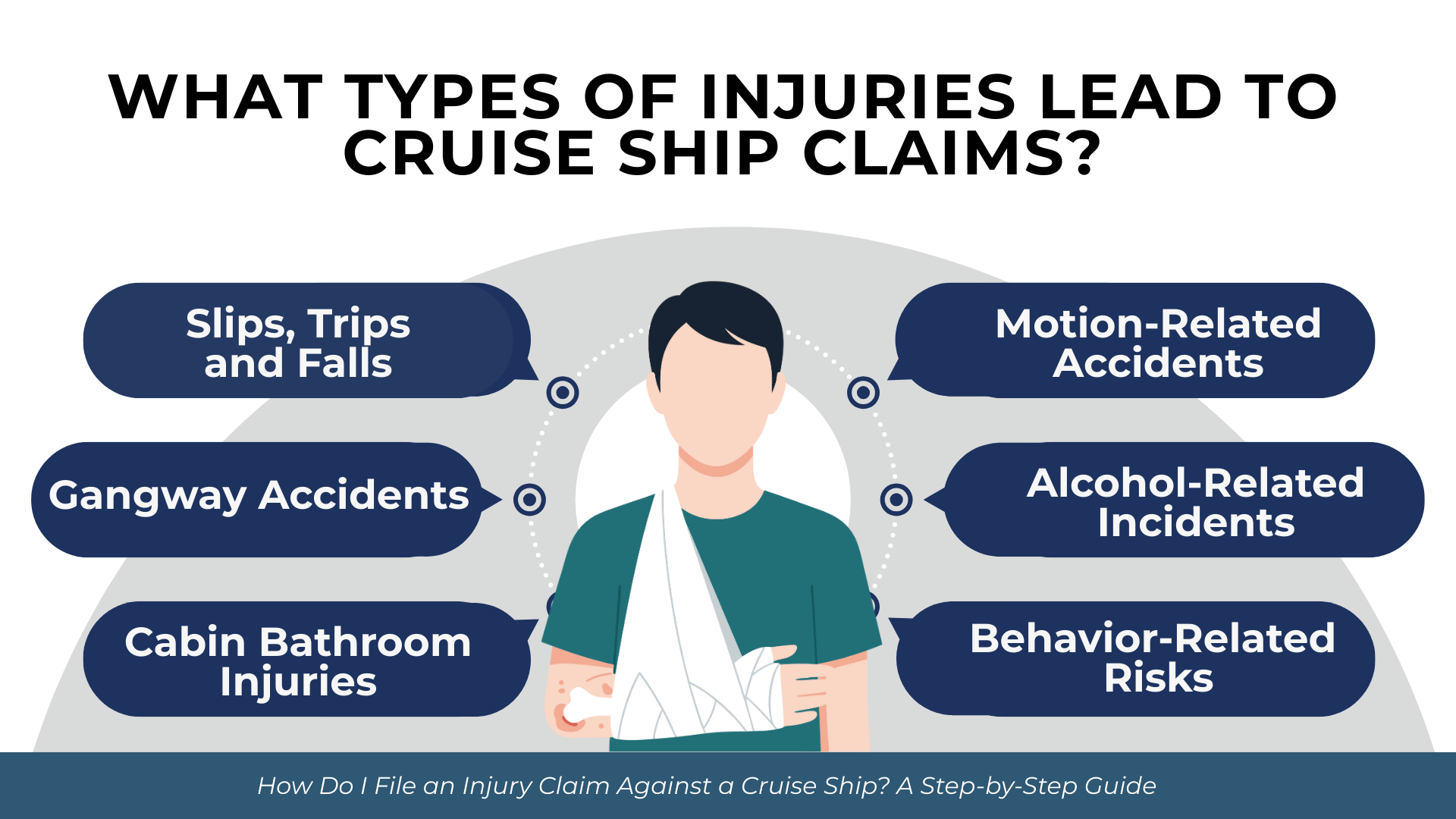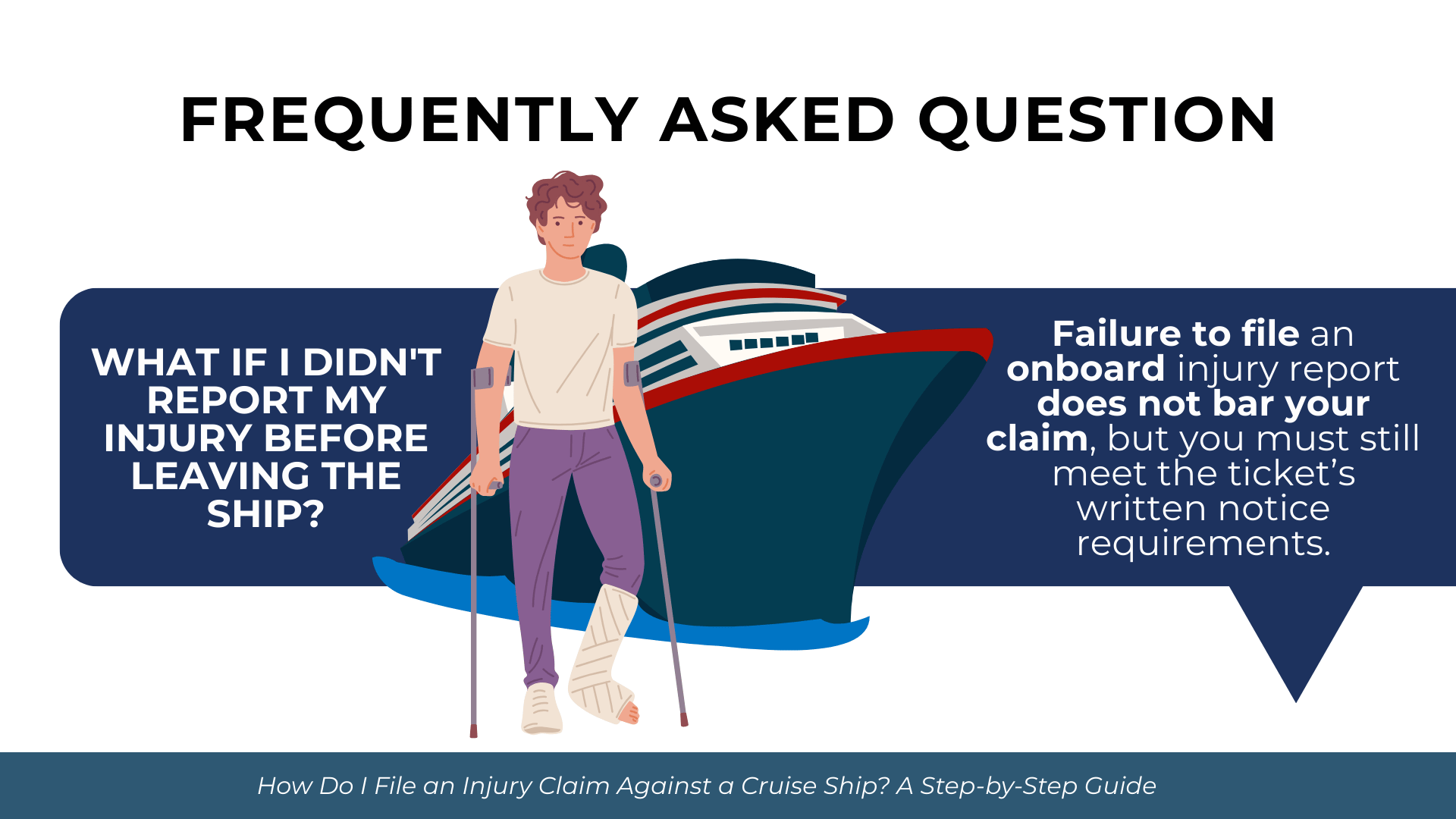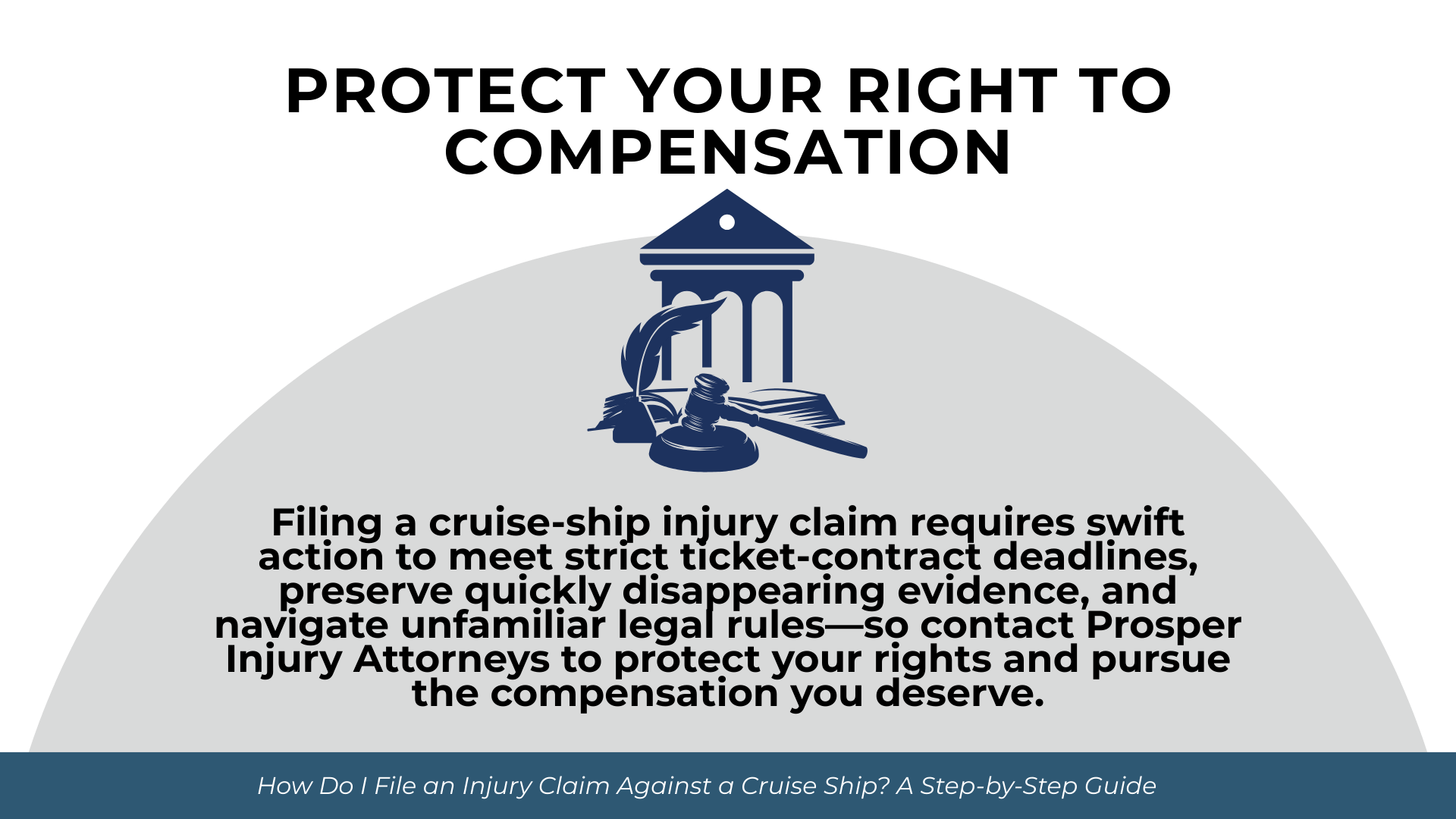Filing an injury claim against a cruise ship is not like filing a typical personal injury lawsuit. Cruise ship injuries fall under federal maritime law, which imposes unique procedural requirements, strict contractual deadlines, and mandatory venue rules that passengers rarely encounter in other contexts. Missing a single deadline—sometimes hidden in the fine print of your ticket—can eliminate your right to compensation entirely.
This guide explains what you need to know about the claims process, from the legal framework governing your case to the evidence you must preserve and the deadlines you cannot afford to miss.
What Law Governs Cruise Ship Injury Claims?
When you are injured aboard a cruise ship, your claim is governed by federal maritime law rather than the state law that would typically apply to a slip-and-fall or negligence case on land. Understanding why maritime law applies helps explain the unique rules you will encounter throughout the claims process.
The location test
A tort falls under maritime jurisdiction when it satisfies a two-part test established by the U.S. Supreme Court in Grubart v. Great Lakes Dredge & Dock Co., 513 U.S. 527 (1995). The first requirement is the location test, which asks whether the injury occurred on navigable waters or whether an injury on land was caused by a vessel on navigable waters.
For cruise ship passengers, the location test is almost always satisfied. Injuries that occur while the ship is at sea, docked at a cruise terminal, or traveling through navigable waterways all meet this requirement.
The connection test
The second requirement examines whether the incident has a potentially disruptive impact on maritime commerce and whether the activity bears a substantial relationship to traditional maritime activity. Passenger injuries aboard cruise ships—whether from a fall on a wet deck, an accident in a dining area, or an incident during embarkation—virtually always satisfy the connection test.
What this means for passengers
Because cruise ship injuries fall under admiralty jurisdiction pursuant to 28 U.S.C. § 1333, federal maritime law governs the substance of your claim regardless of where you file suit. This means state tort laws—including state statutes of limitations and procedural rules—do not apply. Instead, you must navigate a distinct body of maritime negligence principles, contractual limitations, and venue requirements.
What Deadlines Must You Meet to File a Claim?
Call us today at (305) 694-2676 or
contact us online for a free case evaluation.
Hablamos español.


The deadlines for cruise ship injury claims are among the most unforgiving in personal injury law. Federal maritime law establishes a baseline three-year statute of limitations under 46 U.S.C. § 30106, but cruise lines routinely shorten this period through contractual provisions in their ticket contracts.
The notice requirement
Most cruise ticket contracts require passengers to provide written notice of their injury claim within a specified period—often six months from the date of the incident. This notice must typically be sent to a designated address and must contain specific information about the accident, injuries, and the passenger’s intent to pursue a claim.
Failure to comply with the contractual notice requirement can bar your claim entirely, even if the underlying statute of limitations has not yet expired.
The statute of limitations
Under 46 U.S.C. § 30508, cruise lines may contractually shorten the three-year maritime statute of limitations to as little as one year. Most major cruise lines exercise this option, meaning you may have only twelve months from the date of your injury to file a lawsuit—not simply to consult an attorney or gather evidence, but to actually initiate legal proceedings.
Why ticket contracts matter
Cruise ticket contracts typically include several provisions that restrict your legal rights:
- Shortened notice periods. Many contracts require written notice within six months, with specific format and delivery requirements.
- Reduced statutes of limitations. The standard three-year maritime deadline is commonly shortened to one year.
- Mandatory venue clauses. Contracts designate where you must file suit, typically requiring litigation in a specific federal court.
- Choice-of-law provisions. Contracts specify that federal maritime law—not your home state’s law—governs the claim.
These contractual provisions are generally enforceable. Courts have consistently upheld reasonable limitations in cruise ticket contracts, even when passengers claim they never read or understood the terms. If you were injured on a cruise ship, reviewing your ticket contract immediately is essential to understanding the deadlines that apply to your specific claim.
Where Must You File Your Cruise Ship Injury Lawsuit?
Even if you live thousands of miles from the cruise line’s headquarters, you likely cannot file your lawsuit in your home state. Forum-selection clauses in cruise ticket contracts dictate where passengers must bring their claims.
How forum-selection clauses work
Nearly all major cruise lines include forum-selection clauses requiring passengers to file suit in the U.S. District Court for the Southern District of Florida (Miami Division). This applies regardless of where you purchased your ticket, where the cruise departed, or where your injury occurred.
For a passenger from Seattle or Chicago, this means traveling to Miami for all court proceedings—depositions, hearings, and potentially trial. The expense and inconvenience are significant, but courts have consistently enforced these clauses against passengers who argue the requirement is unfair.
What courts have said about these clauses
The U.S. Supreme Court addressed forum-selection clauses directly in Carnival Cruise Lines, Inc. v. Shute, 499 U.S. 585 (1991). The Court held that a forum-selection clause in a standard cruise ticket is enforceable if it is fair and reasonable, even though the passenger had no opportunity to negotiate the terms. Courts will invalidate such clauses only if the passenger can prove the clause was obtained through fraud, is fundamentally unjust, or effectively prevents them from pursuing their legal rights.
In practice, courts rarely invalidate forum-selection clauses. Unless you can demonstrate that litigating in the designated forum would be so gravely inconvenient as to deprive you of your day in court, you will need to pursue your claim where the contract requires.
What Must You Prove to Win a Cruise Ship Injury Claim?
Cruise ship injury claims are governed by the general maritime negligence standard established in Kermarec v. Compagnie Générale Transatlantique, 358 U.S. 625 (1959). Under this standard, cruise lines owe passengers a duty of reasonable care under the circumstances—not a heightened “common carrier” duty and not strict liability.
The duty of reasonable care
The cruise line’s duty requires it to act reasonably to protect passengers from foreseeable harm. This includes maintaining safe conditions throughout the vessel, warning passengers of known hazards, and responding appropriately when dangerous conditions arise. A wet deck, for example, requires some form of notice or remediation to satisfy the duty of care. A sudden, unforeseeable spill that causes injury before crew can respond may not constitute a breach.
Establishing the cruise line’s knowledge
One of the most heavily litigated issues in cruise ship injury cases is notice. Under Keefe v. Bahama Cruise Line, 867 F.2d 1318 (11th Cir. 1989), a cruise line is liable only if it had actual or constructive notice of the dangerous condition that caused your injury.
Actual notice means the cruise line created the hazard or knew it existed. Constructive notice means the hazard existed long enough that the cruise line should have discovered it through reasonable inspection, or that prior similar incidents put the cruise line on notice of the recurring danger. CCTV footage, maintenance logs, and prior incident reports are critical discovery targets for establishing notice.
Connecting breach to your injury
To succeed on a maritime negligence claim, you must establish four elements:
- Duty. The cruise line owed you a duty of reasonable care under the circumstances.
- Breach. The cruise line failed to meet that duty through action or inaction.
- Causation. The breach was an actual and proximate cause of your injury—meaning the harm was a foreseeable consequence of the negligent conduct.
- Damages. You suffered actual harm as a result, whether physical injury, medical expenses, lost wages, or pain and suffering. Understanding what factors determine settlement value helps you document the right evidence from the start.
Maritime negligence applies a pure comparative negligence standard under United States v. Reliable Transfer Co., 421 U.S. 397 (1975). If you were partially at fault for your injury—running on a wet deck, for instance—your damages are reduced by your percentage of fault but not eliminated entirely.
What Evidence Should You Preserve After a Cruise Ship Injury?
Get started with your complimentary case evaluation today;
call us at (305) 694-2676 or reach us online using our
secure contact form.


Evidence preservation is critical in cruise ship injury cases, and the window for securing certain types of evidence is extremely narrow. Cruise lines have affirmative duties to preserve evidence when litigation is reasonably foreseeable, but passengers must act quickly to ensure nothing is lost.
Time-sensitive evidence
Several categories of evidence require immediate attention after a cruise ship injury:
- CCTV footage. Surveillance systems typically overwrite footage automatically within 7 to 30 days. Without a formal preservation request, video evidence of your accident may be permanently lost.
- Incident reports. Crew members document accidents through internal reporting systems. These reports capture contemporaneous details about the scene, conditions, and witness observations.
- Witness contact information. Fellow passengers who saw your accident will disembark and scatter. Collecting names, phone numbers, and email addresses before leaving the ship is essential.
- Photographs of the scene. Document the location, any hazards, lighting conditions, and your visible injuries as soon as possible after the incident.
- Medical records. If you received treatment in the ship’s medical center, request copies of those records before disembarking.
Medical and witness documentation
Beyond immediate evidence, you should document your injuries thoroughly once you return home. Seek medical evaluation promptly, even if you received treatment onboard, and maintain records of all follow-up care. Keep a journal of symptoms, limitations, and how the injury affects your daily life.
If witnesses are willing, obtain written statements describing what they saw. Memory fades quickly, and contemporaneous accounts carry more weight than recollections months later during litigation.
Demanding evidence from the cruise line
Your attorney can send a formal litigation hold letter demanding that the cruise line preserve all evidence related to your incident—CCTV footage, incident reports, maintenance logs, crew schedules, and inspection records. Failure to preserve this evidence after receiving such a demand may result in an adverse inference instruction at trial, allowing the jury to presume the missing evidence was unfavorable to the cruise line’s defense.
Time is critical. Evidence that could prove your case may disappear if you wait too long to assert your preservation rights.
What Types of Injuries Lead to Cruise Ship Claims?
While this guide focuses on the claims process, understanding common injury patterns provides context for why these procedures matter. Cruise ships present unique hazards that generate a consistent flow of passenger injury claims.
Where injuries most commonly occur
Available studies indicate that approximately 45% of cruise injuries involve slips, trips, and falls. The cruise ship environment creates numerous hazard zones: pool decks and spa areas where water accumulates constantly, thresholds and door lips designed for watertight integrity, stairways affected by ship motion, and dining areas where spilled food and beverages create slick surfaces.
Gangways during embarkation and disembarkation are particularly high-risk due to changing inclines affected by tides, wet conditions, and crowded foot traffic. Cabin bathrooms—compact spaces with hard surfaces and step-up ledges—also generate significant injury claims.
Behavioral and environmental factors
Ship motion is an underlying factor in many accidents. Even in calm conditions, gentle pitch and roll can affect balance, particularly for passengers unfamiliar with the maritime environment. Rougher seas amplify every hazard, and sudden motion can push passengers off balance on stairs, around pools, or in dining areas.
Passenger behavior also contributes to risk. Alcohol consumption is elevated on cruises and is involved in a significant share of serious accidents. Running, ignoring warnings, and using closed decks during adverse weather all increase injury likelihood.
Frequently Asked Questions
How long do I have to file an injury claim against a cruise ship?
Federal maritime law provides a three-year statute of limitations, but cruise ticket contracts typically shorten this to one year. Many contracts also require written notice of your claim within six months. These deadlines are strictly enforced, so reviewing your specific ticket contract immediately after an injury is essential.
Can I sue a cruise line in my home state?
Almost certainly not. Most cruise ticket contracts include forum-selection clauses requiring passengers to file suit in the U.S. District Court for the Southern District of Florida. Courts consistently enforce these provisions under Carnival Cruise Lines, Inc. v. Shute, 499 U.S. 585 (1991), even when the requirement creates significant inconvenience for passengers.
What if I didn’t report my injury before leaving the ship?
While reporting your injury onboard creates valuable documentation, failing to do so does not automatically bar your claim. You must still comply with the contractual notice requirements in your ticket—typically requiring written notice within six months to a designated address. The lack of an onboard incident report may affect your evidence, but it does not eliminate your right to pursue a claim if you meet the contractual deadlines. For guidance on the steps you should take while still aboard, see what to do after a cruise ship injury.
Does the cruise line have to give me their surveillance footage?
Cruise lines have an affirmative duty to preserve evidence, including CCTV footage, when litigation is reasonably foreseeable. However, footage is often automatically overwritten within 7 to 30 days. Your attorney should send a formal preservation demand immediately. If the cruise line destroys relevant footage after receiving such a demand, it may face sanctions or an adverse inference instruction at trial.
What happens if I miss the notice deadline in my ticket contract?
Missing the contractual notice deadline can bar your claim entirely, even if the statute of limitations has not expired. Courts have consistently upheld these provisions as enforceable. If you are approaching a deadline, consulting a maritime injury attorney immediately is critical—there may be limited exceptions or arguments available depending on your circumstances.
Protect Your Right to Compensation
Filing an injury claim against a cruise ship requires navigating strict deadlines, mandatory venue requirements, and a legal framework most passengers have never encountered. The contractual provisions in your cruise ticket may give you far less time than you expect to act, and evidence critical to your case can disappear within weeks.
Understanding these requirements is the first step toward protecting your rights. Acting quickly—preserving evidence, complying with notice requirements, and meeting filing deadlines—is essential to pursuing the compensation you deserve.
Contact Prosper Injury Attorneys to discuss your cruise ship injury claim and ensure you meet every deadline that applies to your case.

